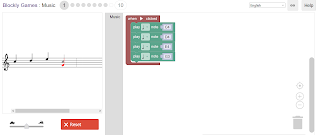Playtest of an Algorithmic Thinking CT Activity Using Blockly Music
Over the last three or so weeks my classmates have created, edited, tested, and perfected a series of learning activities centered around the four computational thinking (CT) concepts: abstraction, decomposition, algorithmic thinking, and pattern recognition. You can find the post detailing the fraught journey I went through to create my own activities here. Part of the process included giving feedback to, and then testing out a.k.a. playtesting, our classmates’ creations. For a variety of reasons, I have given feedback to everyone but have yet to playtest and post about any of them. The lucky winner [1] of my extended purview and review is a learning activity that focuses on algorithmic thinking by Monique!
Most of you readers are probably familiar with the structure of this assignment and for those of you who aren’t you can read the post I linked to above, but as a refresher I will say that for each CT concept we had to make two “plugged” and two “unplugged” activities. The activity I chose to playtest was a plugged algorithmic thinking activity because it had students use a computer tool to achieve the learning objective. Monique wanted students to learn how to code in a fun and accessible way. To do this, she used Blockly Games, a site with coding games in a variety of themes meant to engage all of “tomorrow’s programmers.” Given Monique’s own passion, and talent for, music, it was apt that she chose Blockly’s music game.
During my own search for learning activities, I happened across Blockly’s maze game and lost at least half an hour playing it so I knew I would enjoy their music game as well. The goal of the game is to use blocks that represent lines of code to create an algorithm that plays Frère Jacques when complete. Blockly has the students go in stages as a way to scaffold the activity. Even though I had prior experience with Blockly’s format, it took me a minute to understand that, unlike the maze game where the blocks were always visible, you had to click on either “Music” or “Functions” to access the blocks. Below is a a screenshot of Blockly Maze, followed by a screen shot of Blockly Music.
Once I got the hand of that, I was able to complete the tasks with relative ease even though I have no academic knowledge of music. A few times I got the notes wrong, but when that happened a red note would appear on the sheet music as it played your programmed song, so it was easy enough to fix. Plus, if you wanted to cheat—assuming that, like me, you can’t read sheet music—you can always hover your mouse over the note and it will tell you the exact note. Below is a picture of the first stage where you create the first four notes of the song with an exaggerated wrong note at the end to demonstrate this feature:
Eventually, the program asks students to create multiple programs that all play Frère Jacques twice but use different instruments to do so and start at staggered times. Monique only has the students go to the fifth level which is when they finish coding the entire song, but I was really into it, so I went ahead until I got stuck at level 9. Blockly insists I can streamline my code more to avoid repeating lines unnecessarily. I insist that I can’t do that more than I already have since Blockly doesn’t allow me to use a repeat function block. By the time that I was internally raging at the infernal white text box stopping me from moving on, I decided it was time to throw in the metaphorical towel and ask my professor for help; as of 1:47PM on the 24th of October 2020, however, he has yet had the time to look into it. [2] In case you are a reader who is not my professor and want to try to figure out the problem in my code yourself, here is a link to it. And here is a video of the program playing, although I’m an amateur so I apologize if the various instruments sound discordant to you:
I’ll admit that towards the end I got a bit tired of hearing Frère Jacques, but I certainly accomplished the learning objective Monique aimed for and I even learned a little bit about music!
[1] If Monique happens to be reading this and is not familiar with my brand of written humor, I say lucky winner facetiously. :D
[2] This is also said completely in jest because I only sent him an email about it yesterday and this is understandably very low on the totem pole of importance.



Comments
Post a Comment